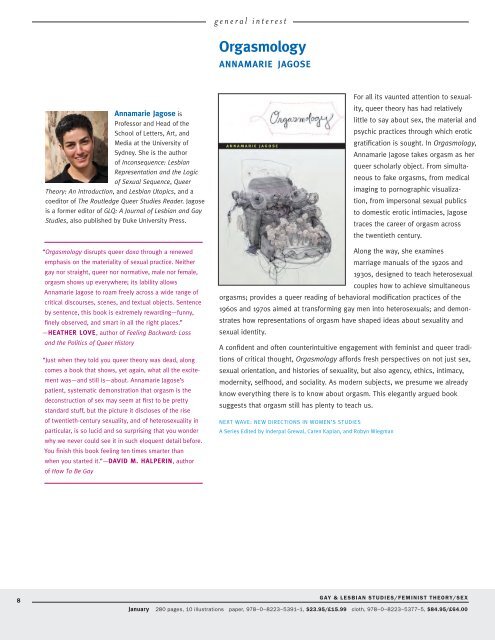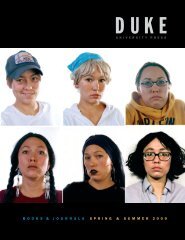Spring 2013 Catalog - Duke University Press
Spring 2013 Catalog - Duke University Press
Spring 2013 Catalog - Duke University Press
Create successful ePaper yourself
Turn your PDF publications into a flip-book with our unique Google optimized e-Paper software.
8<br />
Annamarie Jagose is<br />
Professor and Head of the<br />
School of Letters, Art, and<br />
Media at the <strong>University</strong> of<br />
Sydney. She is the author<br />
of Inconsequence: Lesbian<br />
Representation and the Logic<br />
of Sexual Sequence, Queer<br />
Theory: An Introduction, and Lesbian Utopics, and a<br />
coeditor of The Routledge Queer Studies Reader. Jagose<br />
is a former editor of GLQ: A Journal of Lesbian and Gay<br />
Studies, also published by <strong>Duke</strong> <strong>University</strong> <strong>Press</strong>.<br />
“Orgasmology disrupts queer doxa through a renewed<br />
emphasis on the materiality of sexual practice. Neither<br />
gay nor straight, queer nor normative, male nor female,<br />
orgasm shows up everywhere; its lability allows<br />
Annamarie Jagose to roam freely across a wide range of<br />
critical discourses, scenes, and textual objects. Sentence<br />
by sentence, this book is extremely rewarding—funny,<br />
finely observed, and smart in all the right places.”<br />
—HEATHER LOVE, author of Feeling Backward: Loss<br />
and the Politics of Queer History<br />
“Just when they told you queer theory was dead, along<br />
comes a book that shows, yet again, what all the excitement<br />
was—and still is—about. Annamarie Jagose’s<br />
patient, systematic demonstration that orgasm is the<br />
deconstruction of sex may seem at first to be pretty<br />
standard stuff, but the picture it discloses of the rise<br />
of twentieth-century sexuality, and of heterosexuality in<br />
particular, is so lucid and so surprising that you wonder<br />
why we never could see it in such eloquent detail before.<br />
You finish this book feeling ten times smarter than<br />
when you started it.”—DAVID M. HALPERIN, author<br />
of How To Be Gay<br />
general interest<br />
Orgasmology<br />
annamarie jagose<br />
For all its vaunted attention to sexuality,<br />
queer theory has had relatively<br />
little to say about sex, the material and<br />
psychic practices through which erotic<br />
gratification is sought. In Orgasmology,<br />
Annamarie Jagose takes orgasm as her<br />
queer scholarly object. From simultaneous<br />
to fake orgasms, from medical<br />
imaging to pornographic visualization,<br />
from impersonal sexual publics<br />
to domestic erotic intimacies, Jagose<br />
traces the career of orgasm across<br />
the twentieth century.<br />
Along the way, she examines<br />
marriage manuals of the 1920s and<br />
1930s, designed to teach heterosexual<br />
couples how to achieve simultaneous<br />
orgasms; provides a queer reading of behavioral modification practices of the<br />
1960s and 1970s aimed at transforming gay men into heterosexuals; and demonstrates<br />
how representations of orgasm have shaped ideas about sexuality and<br />
sexual identity.<br />
A confident and often counterintuitive engagement with feminist and queer traditions<br />
of critical thought, Orgasmology affords fresh perspectives on not just sex,<br />
sexual orientation, and histories of sexuality, but also agency, ethics, intimacy,<br />
modernity, selfhood, and sociality. As modern subjects, we presume we already<br />
know everything there is to know about orgasm. This elegantly argued book<br />
suggests that orgasm still has plenty to teach us.<br />
NEXT WAVE: NEW DIRECTIONS IN WOMEN’S STUDIES<br />
A Series Edited by Inderpal Grewal, Caren Kaplan, and Robyn Wiegman<br />
GAY & LESBIAN STUDIES/FEMINIST THEORY/SEX<br />
January 280 pages, 10 illustrations paper, 978–0–8223–5391–1, $23.95/£15.99 cloth, 978–0–8223–5377–5, $84.95/£64.00












